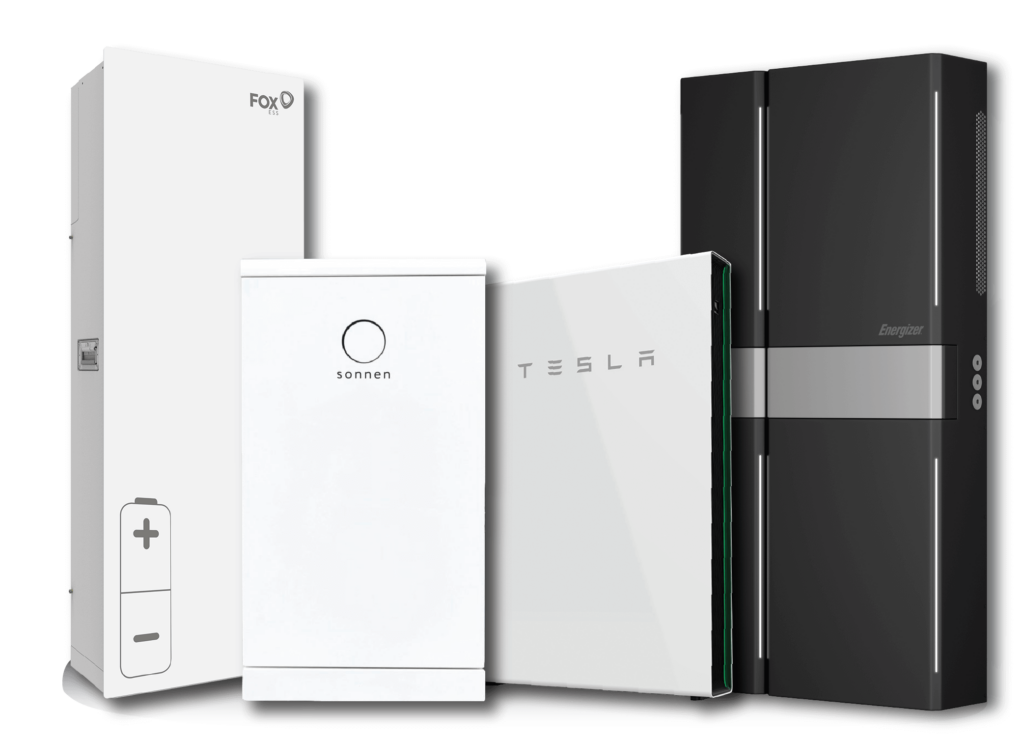There are several types of solar batteries. A stand-alone solar panel system with no grid connection will need a battery to store surplus energy produced by the solar panels. That way you will have stored energy that can be used at night or during periods of low solar energy production.
In this guide, you will learn more about the different types of solar batteries, and hopefully get an idea about which one is the best choice for you!

There are several solar battery types on the Australian market. The two most common types are the lithium-ion battery and the lead acid battery. Different battery types might differ from one another when it comes to lifespan, efficiency, price and maintenance level.
Let’s take a closer look at your choices!
1. Lead acid solar batteries
Lead acid batteries are commonly used in the solar industry and have been on the market for quite some time now. These batteries are among the most affordable, but they are also known to have a shorter lifespan and higher level of maintenance requirements.
One of the benefits of choosing a lead acid battery is the fact that this battery type is well-known and tested. Lead acid batteries are also dependable and will do their job. However, new technology is challenging the acid battery with even higher efficiency.
2. Lithium-ion solar batteries
Today the lithium-ion (or Li-ion) type of solar battery is the most popular choice among Australian solar customers. This battery type might is more expensive than the lead acid battery. Even so, it offers a higher charge and discharge efficiency.
The lithium-ion battery will usually also deliver a higher number of battery cycles during its lifespan. This alone may justify the higher cost.
3. Sodium nickel chloride solar batteries
The sodium nickel chloride solar battery offers competition to the lithium-ion battery. Thanks to its unique technology and chemistry this battery type is the safest. It is also more climate friendly than the Li-ion battery.
The sodium nickel chloride type of solar battery is 100% recyclable and has no fire risk. Another benefit of choosing a sodium nickel chloride solar battery rather than a Li-ion battery is the broader temperature operating range.
While a Li-ion battery typically can operate in temperatures between 0–40 degrees Celsius, the sodium nickel chloride battery can operate in temperatures ranging from -20 to + 60 degrees Celsius. The battery does not need a cooling system as big Li-ion batteries need.
On the negative side, the sodium nickel chloride battery has a lower expected number of battery cycles. Normally the cycle life is around 3.500 cycles. In comparison, the Li-ion battery has around 4-6000 cycles. The sodium nickel chloride battery is also more expensive.
4. Flow solar batteries
Among the newcomers to the Australian battery market, you will also find so-called flow batteries, also known as zinc-bromine flow batteries. These batteries contain a solution that is based on zinc-bromide and water.
Compared to lithium-ion and lead acid batteries, flow batteries have a great advantage: They can be completely discharged throughout their cycle without damaging the battery or affecting its lifespan. With a 100% depth-of-discharge your battery is more robust.
Flow solar batteries can also tolerate high temperatures up to 50 degrees Celsius, and they are naturally fire and explosion resistant. The flow type of solar battery is also easier and cheaper to restore if it stops working: One can simply replace the electrode.
The biggest disadvantage when it comes to the flow battery is its expected lifespan. The battery can usually handle around 4000 cycles. The Li-ion battery can, as previously mentioned, often handle up to 6000 cycles. Flow batteries can also be quite expensive.
So, which type is best?
Both lead acid, lithium-ion, sodium nickel chloride and flow batteries can be good options when installing a solar panel system. However, the lithium-ion battery is usually the best option for most Australians.
With a Li-ion battery, you will get a well-functioning and durable battery, and the cost is medium-high. Lead acid batteries might be more affordable, but they are not as efficient as lithium-ion batteries.
The lithium-ion battery is also the most common battery type on the Australian market, which makes it easier to find a good match for your solar system. If you are struggling to find a suitable battery, your installer may help you.
Explore different types to find the best option
Although many people consider lithium-ion to be the best type of solar batteries, it is not necessarily the best option for you. If you need a particularly heat-tolerant battery or a battery that is easy to maintain (or restore), other battery types can be considered.
Again, it will be wise to consult your installer if you don’t know what battery type is best for you. Find an installer today, and find the right solar battery for your home.